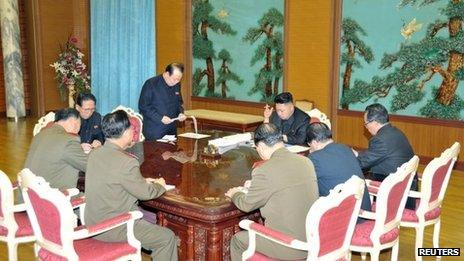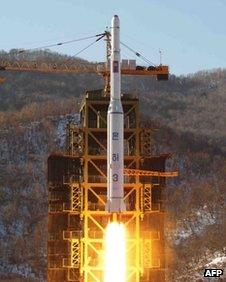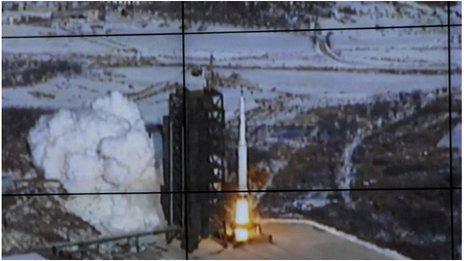Analysis: What is driving North Korea's nuclear test plan?
- Published

A nuclear test - if it went ahead - would be the first under Kim Jong-un
Official announcements from the Democratic People's Republic of Korea (DPRK), including a 24 January statement by the National Defence Committee (NDC), indicate that North Korea may be about to test a nuclear device - the third such instance, following two earlier tests in 2006 and 2009.
The NDC statement warns of the launch of a series of "long-range rockets" and a "higher level" nuclear test targeted against "the US, the sworn enemy of the Korean people".
Satellite imagery analysed by US-based proliferation specialists reveals activity at Punggye-ri, the site of the 2006 and 2009 tests, and suggest that the North may be sealing a mountainside tunnel in imminent preparation for a test.
Why might the North be preparing to test?
1: Deterrence: Since as early as the 1960s, North Korea has sought to become a nuclear state to protect itself from its adversaries, most notably the US, with which it remains in a state of war.
Although Pyongyang has indicated its willingness to give up its nuclear capabilities, most recently in September 2005, when the North agreed to disable its nuclear programme in return for energy assistance and political recognition, its position has hardened appreciably since the collapse of the multilateral six-party talks in December 2008.
The lessons of Gadaffi's Libya, which abandoned its fledgling nuclear programme only to be overthrown by local opposition supported by the US and the international community, has impressed on the North's leaders the need to retain their ultimate security guarantee.
A third test would allow the DPRK to deter an attack from the US and its allies. America has some 28,000 troops stationed in South Korea (ROK) and ROK-US alliance relations will remain robust under the current administration of Lee Myung-bak and his successor Park Geun-hye who assumes office on 25 February.
With Japan, under the new conservative administration of Prime Minister Shinzo Abe, committed to increasing its defence spending, the DPRK may be seeking to strengthen itself in (from the North's perspective) an increasingly hostile environment.

North Korea says UN sanctions over the launch violate its sovereignty
2: Prestige and legitimacy: Passage by the UN Security Council of Resolution 2087, condemning North Korea's 12 December illegal launch of a satellite and imposing a fresh set of international sanctions, has irritated the North Korean leadership.
It has stridently rejected the actions of the UN, while stressing its sovereign right to pursue rocket launches that it claims are primarily for peaceful space development.
In April of 2012, the government modified its constitution to define itself officially as a "nuclear armed nation". Under its youthful 29-year-old new leader, Kim Jong-un, the government has trumpeted its technical achievements, both missile launches and the nuclear weapons programme, as proof of the strength of the North Korean state and, by extension, the new leader.
Since his father's death in 2011, Kim has consolidated his leadership, steadily assuming prominent positions with the state, party and military hierarchies. Enhancing the country's nuclear assets may be a way of tilting the institutional balance within the country away from the military, which has seen some of its senior figures purged in recent months.
3: Technical advancement: US intelligence sources believe, contrary to North Korean denials, that Pyongyang has been seeking to develop a covert uranium-based nuclear weapons programme sufficient to generate enough fissile material to produce two nuclear bombs annually.
Unlike the plutonium-based 2006 and 2009 tests, a uranium-based test would be a step forward in the sophistication of the North's nuclear capabilities. Alternatively Pyongyang, in referring to a "higher level" test, may simply be aiming to test a larger device, substantially bigger than the 1 and 2 kiloton tests of 2006 and 2009.
Marks of success
If the North is determined to test, there is at best a slim possibility that it can be deterred. UN sanctions are relatively toothless, and China, the country with the greatest leverage over the North given its prominent trade and investment ties, may be disinclined to put substantive pressure on Pyongyang, notwithstanding Chinese concerns that the persistent security crisis in the region is bolstering strategic co-operation between the US and its allies in a manner that undercuts Chinese security interests.
A recent editorial in China's state-sponsored Global Times has hinted at the possibility of a cut in Chinese economic aid if a test goes ahead, and such action would not be unprecedented. China suspended economic assistance to the North in 2006 in protest against a series of provocative missile launches.
However, state-backed papers frequently reflect a diversity of political opinions in China. China's senior leadership body, the Politburo Standing Committee, includes a number of prominent North Korea watchers sympathetic to a stable DPRK, and it is premature to assume that China will pressure a North Korea that historically has been fiercely averse to outside interference.
For the North, the benchmarks of a successful test would be multiple. Technically, a high yield test would be self-evidently a sign of national strength. If it could be conducted without any obvious detection of radioactive gases (as was the case in 2009), it might prove an opportunity for the North to enhance collaborative testing with partner states such as Iran that might welcome an opportunity to test covertly.
Testing is also a necessary step in marrying the North's nuclear assets with its ballistic missile capabilities, but it is not yet sufficient to allow the North to pose an immediate and credible strategic threat to its neighbours.
Notwithstanding the 12 December rocket launch, the North's ballistic missile capabilities remain relatively underdeveloped. US intelligence sources suggest that the North has at best 30 intermediate range missiles, few technically proficient launch crews, and remains some years away from developing a genuinely indigenous missile programme.
A nuclear-equipped missile launch would only be attractive in extremis if the North's leadership felt that regime survival was an issue, rather than as a means of securing strategic assets in a future conflict. For this reason, the primary value of a nuclear test is more likely to be political through enhancing the prestige of the government, attracting international attention and allowing the North to enhance its bargaining leverage in future negotiations with the United States and its allies.
Whether such leverage is sufficient to persuade the Obama administration, preoccupied with a range of competing domestic and international challenges, to depart from a policy of "strategic patience" is still unclear, even allowing for the appointment of a new secretary of state - John Kerry - who reportedly favours a more engagement-centred approach to North Korea.
John Swenson-Wright is Senior Consulting Fellow of the Asia Programme at Chatham House and Senior Lecturer, Faculty of Asian and Middle Eastern Studies, at the University of Cambridge.
- Published12 December 2012

- Published10 August 2017
- Published2 April 2013